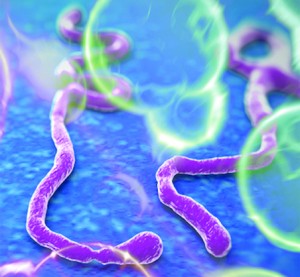By Patrick R. Handley, EMS Clinical Coordinator, Florida SouthWestern State College, Charlotte Campus
 Ebola has been an extremely hot topic in the news during the last month. The media loves to sensationalize just about every hot topic that enters the forefront of our minds. Is Ebola another over-sensationalized topic? Or is there merit to the perceived concerns to this “emerging” disease? What is the chance that outbreaks will emerge in our country? What is the fatality rate of this “deadly” disease? There seems to be more questions than answers –.especially one that has been around since the 1970s, but has not really “knocked on our door” until now. Let’s examine some of the facts.
Ebola has been an extremely hot topic in the news during the last month. The media loves to sensationalize just about every hot topic that enters the forefront of our minds. Is Ebola another over-sensationalized topic? Or is there merit to the perceived concerns to this “emerging” disease? What is the chance that outbreaks will emerge in our country? What is the fatality rate of this “deadly” disease? There seems to be more questions than answers –.especially one that has been around since the 1970s, but has not really “knocked on our door” until now. Let’s examine some of the facts.
The first case of Ebola occurred in 1976 in what is called the Democratic Republic of Congo, near the Ebola River, hence its name. It is currently unknown as to what the source host was, but based on current research, it is believed to have come from fruit bats in the area. There are five different strains of the virus. Four of the five strains currently exist in primate hosts, including humans, apes and monkeys. Since its emergence, there have been many outbreaks in different countries, including Gabon, South Sudan, Ivory Coast, Uganda, South Africa and Liberia.
How do we identify this disease in others? Initial symptoms of this disease present with fever, weakness, muscle pains and aches, headache, and sore throat. These symptoms are not much different from any influenza contracted currently and generally occur within eight to 10 days following exposure. The next symptoms to develop include abdominal pain, vomiting and diarrhea. Then the late signs of coughing up blood, bloody diarrhea, blood oozing from the gums, eyes, nose and ears occur late in the disease process.
Laboratory findings in blood work generally discover a low white blood cell count, a low platelet count and an increased liver enzyme count.
Transmission of Ebola occurs through direct contact with broken skin or mucosal membranes by the infected patient’s blood or body fluids (i.e. – urine, saliva, sweat, feces, vomit, breast milk and semen). Contaminated needles can also be the vehicle of transmission. Given these routes of transmission, healthcare workers can best protect themselves by utilizing medical masks, goggles, gloves, gowns, safe injection practices, thorough hand washing and good general hygiene.
There is no current vaccine or medication that has been FDA-approved for the treatment of Ebola. With a fatality rate of approximately 50 percent of all cases, it is imperative that we find a treatment. There are currently, however, two potential vaccines being worked on that are currently in the human safety testing phase. For now, treatment that produces the best survival rates are early re-hydration of fluids, electrolytes and general symptomatic treatment.
Hopefully you can derive a sound judgment on this disease based on the facts presented in this article. Despite the sensationalistic personality of our media, it would appear there is sound evidence to be concerned about this disease. High fatality rates, no medication, no vaccine and flu-like symptoms early in the disease process all add up potentially devastating results. Our best defense for now may be accurate information about the disease and keeping abreast of movements and outbreaks of Ebola. Stay informed.
Florida SouthWestern State College (FSW) Open House week from 3-6 p.m. on November 3, 5 and 6.
All events are free to attend and will be held at FSW’s four locations. Attendees are encouraged to register online at www.FSW.edu/openhouse to ensure a quick check-in process. The dates and locations are:
November 3 – Hendry/Glades Center, 1092 E Cowboy Way, LaBelle, Building A
November 3 – Charlotte Campus, 26300 Airport Rd., Punta Gorda, Bell Tower
November 5 – Collier Campus, 7505 Grand Lely Dr., Naples, Building M
November 6 – Thomas Edison (Lee) Campus, 8099 College Pkwy., Fort Myers, Building U
Biography
Center for Disease Control website,
www.cdc.gov/vhf/ebola
WebMD website, www.webmd.com/a-to-z-
guides/evola-fever-virus-infection
World Health Organization website,
www.who.int/mediacentre/factsheets/fs103/en/
Florida SouthWestern State College
www.fsw.edu
Check Also
The Latest Technology With Hearing Aids
Many modern electronic devices these days come equipped with Bluetooth technology. This feature lets you …
 South Florida Health and Wellness Magazine Health and Wellness Articles
South Florida Health and Wellness Magazine Health and Wellness Articles




